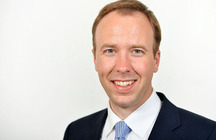Below is the text of the statement made by Matt Hancock, the Secretary of State for Health, in the House of Commons on 13 May 2019.
I would like to update the House on the progress we have made in tackling brain cancer, including on a new innovation that is now available across England.
For far too long, tackling brain cancer has been put in the “too difficult” box, and we are determined to change that. I want to pay tribute to the Petitions Committee, which did so much work on this; my hon. Friend the Member for Mid Norfolk (George Freeman), who picked up the subject in Government as Life Sciences Minister; my hon. Friend the Member for Castle Point (Rebecca Harris), the former chair of the all-party parliamentary group on brain tumours, which brought parliamentarians together; my hon. Friend the Member for St Ives (Derek Thomas), the current chair of the APPG; and, of course, Baroness Tessa Jowell, who campaigned passionately and tirelessly while battling the illness herself, and who, sadly, passed away a year ago.
Brain cancer is the most common cause of cancer-related deaths in children and young people under 19. Baroness Jowell called for all patients to benefit from 5-aminolevulinic acid, or “pink drink” as it is otherwise known: a dye that makes cancerous cells glow under ultraviolet light, thereby making it easier for surgeons to target the right areas. Trials have shown that, when the dye is used, surgeons can successfully remove a whole tumour in 70% of cases, compared to 30% of those without.
I am pleased to inform the House that we have now rolled out this ground-breaking treatment aid across England, with the potential to save the lives of 2,000 patients every year. That is part of the £33.9 billion extra that we are putting into the NHS and the NHS long-term plan. This procedure will now be expanded to every neurological centre in England. That is a fitting testament to Tessa Jowell’s memory.
It is worth pausing for a moment to remember the courageous words that Tessa Jowell used to urge us to rise above our differences. She said that this
“is not about politics but about patients and the community of carers who love and support them. It is…about the NHS but it is not just about money. It is about the power of kindness”.—[Official Report, House of Lords, 25 January 2018; Vol. 788, c. 1169.]
That represents the very best of our democracy and of our Parliament. On behalf of all those who have died of brain cancer, all those—children and adults alike—who have campaigned, and all those seeking to do research, of which there is more to come in future, we are acting.
I want to mention three further areas in detail. The first is research. In the past, not enough research was done into the causes of and treatments for brain cancer. In the last year, the Government have made an unprecedented £40 million available to fund cutting-edge research of new treatments and drugs through the National Institute for Health Research. That will build on our outstanding reputation for neuroscience and oncology research, and increase the quality, quantity and diversity of brain cancer research. That funding was further enhanced by Cancer Research UK committing an additional £25 million to support brain tumour research. The size of those pledges will cement the UK’s position as a leading global centre.
Secondly, on our NHS cancer workforce, the number of specialist cancer staff in the NHS is set to grow as we put the £33.9 billion into the NHS over the next five years. Health Education England’s cancer workforce plan, and our upcoming NHS people plan, will set out in detail the steps we are taking to recruit a world-class cancer workforce. We made available an additional £8.6 million in the cancer workforce last year, and we aim to have 300 more radiographers start training by 2021.
Finally, on empowering patients, we have worked closely with the Tessa Jowell Brain Cancer Mission, Jess Mills and others to ensure patients are at the heart of all these efforts. The mission brings together Government, the NHS, researchers, pharmaceutical companies and patients to ensure that data is shared and disseminated properly so that more patients in the UK and around the world can benefit from what is learnt. Due to the complexity of brain cancer, we must provide joined-up care that meets each patient’s unique needs. The NHS is focused on improving care for brain cancer patients to ensure they have access to dedicated out-patient clinics and consultations, wherever they live.
I hope the whole House will recognise the important progress made over the past year in rising to the challenge set by Baroness Jowell and the families of those who have lost loved ones to brain cancer. That progress has been possible only through the collective effort of patients, the NHS, charities and industry. That work is and will continue to be collaborative.
In her final speech in the other place last January, Tessa Jowell said:
“I am not afraid. I am fearful that this new and important approach may be put into the ‘too difficult’ box, but I also have such great hope.”—[Official Report, House of Lords, 25 January 2018; Vol. 788, c. 1170.]
That hope was an inspiration to us all. We will rise to the challenge that she left us. We must not waiver in that task. I commend this statement to the House.
